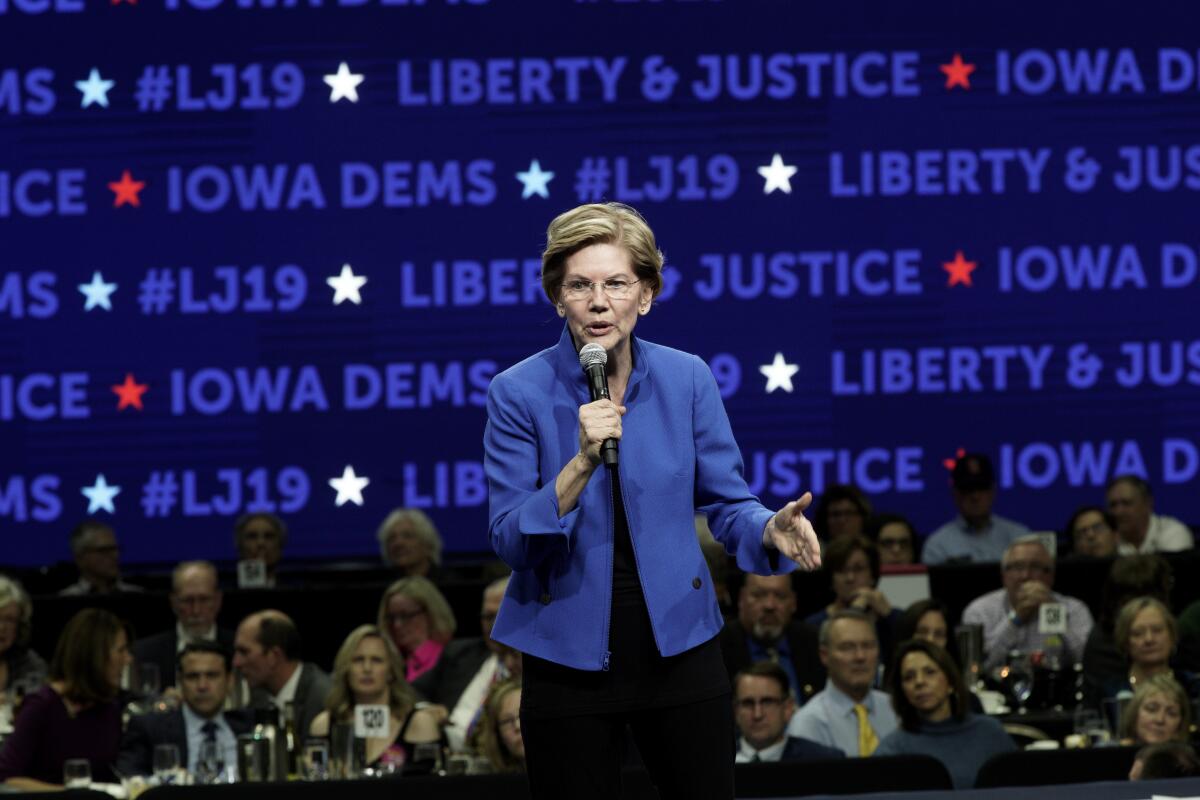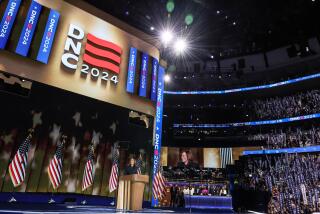Elizabeth Warren took down an Obama nominee from Wall Street. Was it for nothing?

- Share via
WASHINGTON — In 2014, two years after she was first elected to the Senate, Elizabeth Warren took on President Obama in an unlikely fight that cemented her status as a leader of the Democratic Party’s progressive wing.
The Massachusetts Democrat turned a little-known nominee for an obscure Treasury Department job into a poster child for Wall Street’s controversial ties to Democrats.
Warren won — stopping Antonio Weiss, the former head of investment banking for the financial advisory firm Lazard, from becoming undersecretary for domestic finance.
It was an early sign of Warren’s ability to galvanize liberals, much as she’s doing in the 2020 presidential race, by stoking long-simmering intraparty battles. Warren and Obama repeatedly clashed over policy, tactics and personnel, boosting her profile but drawing accusations of grandstanding and rigidity.
“President Obama was the unquestioned leader of the party.… Nobody had ever tanked a nomination that he sent,” said Murshed Zaheed, a progressive activist who backed Warren. “She took a direct shot. She put a marker down.”
Warren’s bare-knuckle tactics also showed she was willing to take personal shots at her targets — in this case one she had never met.
At one point, the former Harvard professor mocked Weiss’ affiliation with a storied literary magazine, the Paris Review, turning up the kind of populist rage that President Trump would later exploit from the right.
“People say opposition to Mr. Weiss is unreasonable because — wait for it — he likes poetry,” Warren told financial reform advocates at a Senate event, drawing snickers.
“I’m actually not kidding on this one. Supposedly, because he helps publish a literary magazine called Paris Review we should trust that he will zealously pursue financial reform,” she continued. “Now, I confess, I don’t read many literary magazines. But really? If he liked monster truck racing, would that show that he supported Wall Street bailouts?”
Weiss withdrew from consideration for the job, but went on to work as a counselor to the Treasury secretary, effectively doing the undersecretary’s job without the title. Years later, even some of Warren’s left-leaning allies think she picked the wrong target.
“She was wrong about that,” said Barney Frank, a former Massachusetts congressman who co-wrote the Dodd-Frank financial reform bill that gave Warren an influential perch in Washington. “She was proven wrong.”
One of Warren’s allies, who requested anonymity to stay out of the spat, called Weiss “a model public servant,” who protected key provisions of Dodd-Frank and helped pensioners in Puerto Rico in the island’s 2014 debt crisis.
“Weiss personally made that his mission, to get something that would protect workers and retirees,” said another person who worked with Weiss and Warren and requested anonymity to avoid getting involved in the presidential contest. “He wasn’t standing up for the banks.”
Warren and Weiss, now a senior fellow at Harvard’s Kennedy School of Government, declined to comment, and Warren declined to answer a written question about whether she regrets the episode. But Weiss later developed a productive relationship with Warren and her staff, according to several people, including an aide to Warren.
Weiss always faced a difficult path to confirmation. Obama nominated him in November 2014, just eight days after Democrats lost badly in midterm congressional elections, giving Republicans control of the Senate.
Some Democrats believed Weiss could win Senate approval in the brief lame duck period when Democrats still held the majority. If not, they’d need to compromise with Republicans.
Warren blew those plans up when she came out against Weiss days after he was nominated.
She cited roughly $20 million in stock awards he was given when he left Lazard, and his work advising Burger King and Tim Horton’s, a Canadian doughnut chain, on a merger that allowed the combined company to take advantage of Canada’s lower corporate tax rate.
But most of all, she cited his time on Wall Street.
Warren had been frustrated for years with the Democratic establishment’s close relationship with Wall Street, one that dated to the Clinton administration. Many on the left were still angry over Obama’s support for legislation bailing out big banks during the 2008 financial crisis, while giving less relief to people who lost their homes in foreclosure.
And through all of that, Warren was fighting off efforts to weaken Dodd-Frank, not trusting Obama’s advisors to protect the law from what she called “an army of lobbyists.”
Warren had helped thwart other Obama nominees, including former Harvard President Lawrence Summers as chairman of the Federal Reserve board in 2013.
She also led a temporary revolt against a 2014 spending deal with Republicans, nearly causing a federal government shutdown, because of a provision that she argued would “let derivatives traders on Wall Street gamble with taxpayer money and get bailed out by the government when their risky bets threaten to blow up our financial system.” She ultimately backed down.
Weiss’ defenders argued that the Obama donor was a liberal Democrat who said in one paper, for example, that higher taxes were a better way to balance the budget than spending cuts. His financial firm, Lazard, was not one of the big banks fighting Dodd-Frank regulations and had not received a bailout.
The anti-elitist argument may have seemed rich coming from Warren.
Not only was she once Harvard’s highest-paid law professor, she had also represented corporate clients in complicated lawsuits, including one involving coal miners’ health benefits that put her at odds with their union. (Warren argued that the workers would have gotten the benefits even if her side — which lost — had prevailed.)
When she set up the Consumer Financial Protection Bureau for Obama in 2011, before running for office, she picked a banker as her top deputy.
None of that mattered once she laid out her case against Weiss in an article in the Huffington Post.
“At a minimum, the theory was that he would get a fair hearing and a fair lineup of meetings” with senators, said one person familiar with the process who requested anonymity to avoid angering Warren. “The mood just shifted so quickly. There was not really an opportunity to make the case.”
Progressive groups, many of whom had never heard of Weiss, took Warren’s side immediately, signing petitions and calling Democratic Senate offices.
“It was a moment of coming out with a bang,” said Neil Sroka, communications director for Democracy for America, a liberal political group. “It was kind of like a massive show of progressive power.”
“There was a lot of consternation around how the Obama administration was cozying up to Wall Street,” said Zaheed, the activist. .
Weiss’ supporters initially believed they could withstand Warren’s strong-arm tactics. But the negative publicity proved too much for other Democratic senators, who began announcing their own objections, leading Weiss to withdraw his name.
“We strongly believe that the opposition to his nomination was not justified,” an Obama spokeswoman said at the time.
Obama himself said little. But months later, as Warren urged opposition to his proposed trans-Pacific trade deal, Obama made clear his frustration with Warren’s aura of ideological purity.
“The truth of the matter is that Elizabeth is, you know, a politician like everybody else,” Obama told Yahoo News, rejecting Warren’s argument that the pact would allow the unraveling of consumer financial protections.
At the time, some supporters urged Warren to challenge Hillary Clinton for the 2016 Democratic presidential nomination. Warren did not run, but the push sent Clinton a message.
Some allies say Warren was driven by conviction to fight against Weiss but that she also sought to protect her left flank from Vermont Sen. Bernie Sanders, who ran in 2016 and remains among the top contenders for 2020.
Warren interacted with Weiss publicly once, when he testified before the Senate Banking Committee in April 2016, more than a year after the nomination fight. Warren sometimes berates public officials in public hearings, relying on her years of debate experience to puncture their arguments in exchanges that often go viral.
When Weiss testified, she treated him as an ally, praising him for making “a very interesting point” about financial reform.
“Let me just underline that point and make sure we’re exactly on the same page,” she told him.
Did Dodd-Frank financial regulations make Wall Street better equipped to avoid a financial panic like the 2008 crisis?
“Without a doubt,” Weiss replied.
And with that, both of them moved on.
More to Read
Get the L.A. Times Politics newsletter
Deeply reported insights into legislation, politics and policy from Sacramento, Washington and beyond. In your inbox three times per week.
You may occasionally receive promotional content from the Los Angeles Times.











